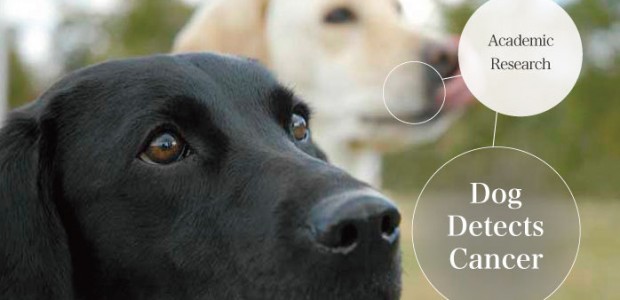Now, I am sure that you are all familiar with dogs that have been trained to help sniff out things like bombs or drugs, and these ever faithful companions have also helped pull people from disasters like fires. However, did you know that dogs could also be trained to sniff out deadly diseases like ovarian cancer?
A team of researchers at University of Pennsylvania’s Working Dog Center are hard at work training a group of German Shepherds and retrievers to use their very powerful sense of smell to identify ovarian cancer. If they succeed, their work could actually lead to the development of a new device that could be used to save the lives of thousands each year here in the United States alone!
As with a number of other types of cancer, detecting ovarian cancer early can mean the difference between life and death. Unfortunately, the most common symptoms of ovarian cancer are fairly non-specific. In most cases, doctors are not able to detect the disease until after it has already begun to metastasize. As it stands, ovarian cancer is the fifth leading cause of cancer-related death in the U.S.
Scents that could Save Your Life
In order to train dogs to detect certain scents, it involves a simple but lengthy technique known as imprinting. The trainer begins by taking a certain object that the dog is familiar with (blanket, toy, etc.), and they cover the object with the substance they want the dog to detect (drugs, chemicals, human or animal scents). Then they put the scented object in a box and wait for the dog to find it. This exercise is repeated over and over, and every time the object is made a bit smaller. By the end, the object is removed entirely as the dog has learned to seek out that specific scent.
This research team from Penn began by training the dogs to detect an ovarian tumor. Next, they trained the dogs to detect plasma extracted from the tumor. The final step of this training process is a bit trickier. The cancerous ovarian plasma is broken down into its individual chemical components. For this project to succeed, they need to find a chemical that is unique to ovarian cancer. So, they run a few trials where the dogs sniff each chemical. The scent that draws the dogs will be the chemical on which they can base the design of new sensor.
Dogs that can Detect Disease
Our four legged best friends have always been well-renowned for their keen sense of smell, especially the bloodhounds! This breed is quite famous for their noses (they have 230 million olfactory receptor cells which is about 40 times as many as in human noses). In fact, their sense of smell is so reliable that the breed’s scent-tracking abilities have been used in court as evidence.
However, many researchers are just now theorizing that a variety of other canine breeds may have nasal abilities far outreaching what was originally believed. Additionally, it seems that certain breeds are better-suited to specific types of work.
“The bloodhounds are trailing dogs, man-tracking dogs,” stated Cindy Otto, one of the Penn researchers. “They have really good noses. But for a lot of the other work — what we call ‘air-scenting’, where the dog raises his nose in the air and tries to find the source of a smell, those tend to be the retrievers, the hunting dogs.”
The retrievers were originally bred to be trainable dogs, which equates to them being a bit more reliable off leash than the scent-crazy bloodhounds.
Detecting Cancer, Infections, and even Seizures
Studies have already proven that dogs can be adept at detecting infections, and nearly 10 years ago, a team of British scientists discovered that dogs were capable of detecting bladder cancer when allowed to sniff the patient’s urine. Dogs also have the ability to predict seizures in epileptics and “superbug” infections that could be fatal.
This particular field of research has expanded rapidly over the last decade. Nowadays, it seems like dogs are being used for almost anything. At the University of Washington’s Center for Conservation Biology dogs are being trained to monitor various wildlife populations and to sniff out specific types of animal droppings. Heck, dogs can even be trained to find killer whales in the ocean just by sniffing out their dung.
With the possibilities all but limitless, it is very exciting to think how their ability could be used to save many women from dying due to ovarian cancer. Only time will tell whether this ovarian cancer research will be a success, but this is definitely a topic that we will keep you updated on.

